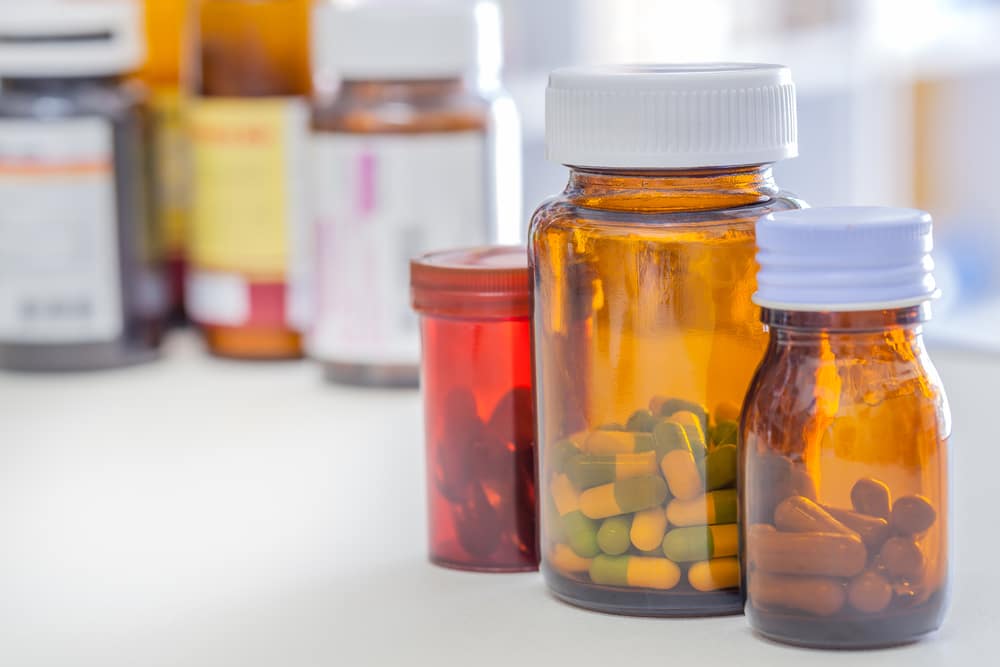Contents:
- Medical Video: Top 10 Common Habits That Damage Your Kidneys - You Must Know!
- Various types of drugs that damage the liver
- 1. Acetaminophen (Paracetamol)
- 2. NSAIDs (Non-Steroid Anti-Inflammation)
- 3. Antibiotics
- 4. Methotrexate
- 5. Amiodarone
- 6. Statins
- 7. Nicotine Acid (Niacin)
- 8. Anticonvulsant drugs
- 9. Azathioprine
- 10. Antidepressants
- 11. Other medicines
- Supplements and herbal medicines can also damage the liver
Medical Video: Top 10 Common Habits That Damage Your Kidneys - You Must Know!
Each drug you consume will pass through the liver to be broken down before being used by the body. Remnants of unused chemical substances are then removed by the liver so they do not accumulate into toxins in the body. This process usually takes place efficiently and without causing danger. After all, medical drugs on the market have passed previous rigorous medical tests to ensure that the effects will not damage the liver. But if not consumed according to the rules of use, then the drug can cause liver damage. What are the types of drugs that damage the liver?
Various types of drugs that damage the liver
Many drugs can affect liver function, damage it, or do both. Some drugs can even cause direct damage to the liver and cause symptoms such as jaundice, abdominal pain, itching, and a tendency to be more prone to bruising and bleeding. In some cases, drug damage may not show any symptoms at all, so the damage can develop even worse without being noticed.
Here are a number of drugs that damage the liver.
1. Acetaminophen (Paracetamol)
Acetaminophen (paracetamol) is often contained in fever-lowering drugs, flu reliever, also prescription-free pain relievers. Most pain medications labeled as "non-aspirin" contain acetaminophen as the main ingredient.
If used as directed, acetaminophen is very safe even for people with liver disease. However, acetaminophen which is taken too much at once or taken in high doses continuously for more than 3-5 days can cause liver damage.
For those of you who are healthy, it is recommended not to consume acetaminophen more than 1000 mg per drink, or no more than 3000 mg per day - a maximum of 1,000 mg every 8 hours.
2. NSAIDs (Non-Steroid Anti-Inflammation)
NSAIDs are painkillers, for example for fever and headaches. NSAIDs are also usually prescribed to treat inflammation of bones and joints, such as arthritis, tendinitis, and bursitis. The most commonly used types of NSAIDs are aspirin, ibuprofen, naproxen, and diclofenac.
Ibuprofen and other NSAIDs rarely affect the liver, but this complication is more common in people taking diclofenac. Liver damage from diclofenac can take weeks to months after you start taking it.
3. Antibiotics
Antibiotics can also be harmful to the liver if not consumed properly. An example is Amoxicillin / clavulanate which is used for bronchitis, sinus, and throat infections, and isoniazid, an antibiotic used to treat tuberculosis.
Liver damage from amoxicillin / clavulanate can occur as soon as you start using it, although signs of liver damage are often detected late - even after you stop treatment. While acute liver injury resulting from isoniazid can appear several weeks to months after you start using it.
This is why you are emphasized not to drink alcohol while taking isoniazid, also along with other drugs such as acetaminophen and rifampicin. Examples of other antibiotics that can damage the liver include clindamycin, erythromycin, nitrofurantoin, rifampin, sulfonamide, tetracycline, and trimethoprim / sulfamethoxazole.
4. Methotrexate
Methotrexate is a drug used for long-term treatment of severe psoriasis, rheumatoid arthritis, psoriatic arthritis, cancer, and some patients with Crohn's disease. Patients who have pre-existing liver disease, obesity, and those who drink alcohol regularly are very at risk of developing liver cirrhosis due to consumption of methotrexate. Methotrexate is also reported to cause fatty liver.
So, doctors will usually prescribe methotrexate in low doses once a week. Some doctors also carry out liver biopsies in patients without liver symptoms after two years (or after a cumulative dose of 4 grams of methotrexate) to detect early liver cirrhosis.
5. Amiodarone
Amiodarone is a drug used to treat irregular heart rhythms (arrhythmias) such as atrial fibrillation and ventricular tachycardia. Amiodarone can cause liver damage from mild and easily canceled liver enzyme abnormalities, fatty liver, to acute liver failure and permanent cirrhosis. This is because a large amount of amiodarone is stored in the liver.
The rest of the stored drug can cause fatty liver, hepatitis, and more importantly, this drug can continue to damage the liver even after the drug is stopped. Serious liver damage can cause acute liver failure, cirrhosis, and the need for liver transplantation. However, serious liver damage occurs in less than 1% of patients.
6. Statins
Statins (atorvastatin, simvastatin, lovastatin, and pravastatin) are drugs to lower "bad" cholesterol (LDL) and prevent heart attacks and strokes. These drugs tend not to cause significant liver injury, but statins often affect blood function tests of the liver.
Statins can increase liver enzyme levels, but most doctors believe that statins are safe for long-term use. This disorder usually improves or actually heals when stopping statins or reducing doses.
Statins in reasonable doses do not cause permanent damage. However, high-dose statins can cause liver toxicity (hepatoxicity) which can cause severe damage, including liver failure leading to liver transplantation.
7. Nicotine Acid (Niacin)
Niacin, like statins, is used to treat elevated blood cholesterol levels and increase triglyceride levels. And just like statins, niacin can damage the liver. Niacin can cause increased results on AST and ALT blood tests, jaundice, and in rare cases, niacin can cause liver failure.
Liver poisoning (hepatoksisitas) can also occur after the use of high-dose niacin - more than 2 grams per day. Patients with pre-existing liver disease and those who drink alcohol regularly have a higher risk of developing liver toxicity.
A sustained-release type of niacin is also more likely to cause liver toxicity compared to immediate release.
8. Anticonvulsant drugs
Some anticonvulsant / antiepileptic drugs can cause liver damage. Phenytoin can cause liver damage as soon as you start drinking it, which is why your liver test will be monitored closely. Valproate, phenobarbital, carbamazepine, and lamotrigine can also cause liver injuries that may appear a little later after you have taken them for weeks or months.
9. Azathioprine
Azathioprine is a drug that controls the immune system. Examples of drug use are for Crohn's disease and autoimmune hepatitis. Liver damage can occur several weeks to months after taking azathioprine.
10. Antidepressants
Antidepressants are drugs to treat clinical depression or prevent recurrence. It can also be used to treat several other conditions, including dysthymia, anxiety disorders, obsessive obsessive compulsive disorder (OCD), eating disorders, chronic pain, neuropathic pain, attention-deficit hyperactivity disorder (ADHD), addiction, snoring, migraines, and menstrual pain (dysmenorrhea).
Some examples of antidepressants that can damage the liver include bupropion, fluoxetine, mirtazapine, paroxetine, sertraline, trazodone, and tricyclic antidepressants such as amitriptyline. Risperidone and quetiapine are both used as antipsychotics and antidepressants. These drugs can cause blockages in the flow of bile from the liver (cholestasis).
11. Other medicines
Other drugs that can damage the liver include birth control pills, anabolic steroids, antifungal drugs (ketoconazole, terbinafine), acarbose (diabetes medicine), antiretroviral drugs (HIV infection drugs), disulfiram (drugs to treat alcoholism), allopurinol (preventative medicine gout attack) and antihypertensive drugs (captopril, enalapril, irbesartan, lisinopril, losartan, verapamil).
These drugs can damage the liver, which can cause liver injury to hepatitis even in moderate doses. It is important that you take your medication exactly as prescribed and do not drink alcohol when you drink it.
Supplements and herbal medicines can also damage the liver
In addition to medical drugs, supplements and herbal medicines can also cause liver damage. Moreover testing of supplements and herbal medicines is usually not as strict as testing medical drugs. Therefore, the potential danger may be greater for your health.
Herbal medicines that are harmful to the liver include (and are not limited to) borage, comfrey, and certain Chinese herbs, such as zi cao (groomwell), han kuan dong (coltsfoot), qian li guang (liferoot), and pei lan ( Eupatorium) contains pyrrolizidine alkaloids.
Pyroglizidine alkaloids can damage the liver gradually if taken in small doses for a long time. Damage can occur more quickly if the drug is consumed in large quantities. Vessels in the liver can become blocked and block the flow of blood from the liver.
Some other herbal ingredients commonly made by tea, for example include Ma Huang, Kava Kava, germander, and chaparral leaves have been reported to cause liver poisoning (hepatoxicity). Even the popular ginger taken as herbal medicine is reported to have blood thinning properties that can cause acute kidney bleeding in patients with liver disease.
Excessive consumption of vitamin A for years can also damage the liver. Liver disease caused by vitamin A includes a mild increase in liver enzymes in blood tests, hepatitis, chronic hepatitis with cirrhosis, to liver failure.
We recommend that you do not take supplements or herbal medicines that have not been proven safe through BPOM clinical trials. Even if proven safe, do not consume excessively. Remember, always read the rules of use.












